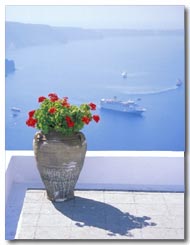

 |
|
 |
|
 |
|
 |
|
 |
|
|
|
|
Simply put... We believe in exploring routes that minimize the impact on local ecosystems and maximizes your experience in natural surroundings. EcoGreece believes in sharing the culture and wildlife of Greece. For us it is a lifestyle rather than a job.We love what we do and it shows in our tours. Our tours offer a contrast of colors, sounds and tastes. Let us be your guide to dramatic whitewashed villages set among rugged hillsides, take you to secluded beaches and lead you through deep gorges. Enter small villages by horse back and meet the hospitable and proud people. Relax on your sailboat as the day goes by. Let us bring you by a taverna at the waters edge where you can choose Greek cuisine right from the kitchen. |
 |
|
Our tour leaders are Greek professionals that have an extreme passion to provide quality service so your trip is memorable and outstanding. Our leaders have special insights that will give you a better understanding and appreciation for the places you will visit, the wildlife you may encounter and the people you will meet. We know that the right leader will enhance your adventure, as you grow in understanding the world around you. We offer personalized service, competitive prices and the joy of a vacation to remember. Above all we realize that to have you as a client tomorrow we must gain your trust today. For a vacation with great service and a terrific sense of adventure... the name is ECOGREECE. |
 |
|
Let us start with the name Greece. In Greek it is called Hellas, and is officially known as the Hellenic Republic or (Elliniki Dimokratia). Its location is in southeastern Europe occupying the southern most part of the Balkan Peninsula and it is a member of the European Union (EU). The largest city and the Greek capital is Athens. Shipping and tourism are the dominant industries of Greece. The country's merchant ship fleet is one of the largest in the world.
The Greek people have a proud history that stretches back thousands of years. In the first millennium BC, ancient Greek city-states led by Athens made tremendous advances in government, philosophy, and the arts. The ancient Greek civilization was concentrated on the coastlines of present-day Greece and its islands, as well as the Aegean coast of what is today Turkey. The archaeological remains of many of the cities and sacred sites of ancient Greece are located in modern Greece.
The landscape of Greece is covered by spectacular mountain ranges that border the sea. The Aegean, Mediterranean, and Ionian seas constitute the country's eastern, southern, and western borders, and no part of mainland Greece is more than 100 km (60 miles) from the water. Islands constitute about one-fifth of the country's land area. Greece's total area is 131,957 sq km (50,949 sq
mi). Islands Mainland Greece includes the regions of Thrace and Macedonia in the north; Epirus, Thessaly (Thessalia), and Central Greece in the central section; and the Peloponnisos, a peninsula connected to the rest of the mainland by the Isthmus of Corinth, in the south. Of Greece's more than 2,000 islands, only about 160 are inhabited. Major islands include Crete (Kriti), Euboea (Evvoia), Ikaria (Icaria), Khios (Chios), Limnos (Lemnos), Lesvos (Lesbos), Samos, Samothraki (Samothrace), and Thasos. Greece also has four island groups: the Northern Sporades, the Cyclades (Kikladhes), the Dodecanese, and the Ionian Islands. Like much of the mainland, of which they are geological extensions, the islands are generally mountainous and dry. The islands of the Aegean Sea are hilly, rugged, stony, and dry. About 80 percent of Greece's land area are mountainous. The Pindus Mountains, with an average elevation of about 2,650 m (about 8,700 ft), extend from north to south through the middle of the mainland. A northeastern spur of the Pindus range includes Greece's highest point, Mount Olympus (2,917 m/9,570 ft), considered in ancient times to be the home of the gods. Lower mountain ranges, including the Taiyetos Mountains on the Peloponnisos, generally run from northeast to southwest through the country, including on the islands. Much of Greece lies in an earthquake zone, and earthquakes do occur frequently. COASTLINE Although Greece is relatively small, its coastline totals 13,700 km (8,500 mi.), making it one of the longest of any country in the world. The coastal waters of Greece are very shallow and penetrate far inland. The gulfs of Corinth and Saronikos, separated by the Isthmus of Corinth, divide the Peloponnisos from central and northern Greece. Despite its indented coasts, Greece has few good harbors. The Gulf of Saronikos has the best anchorages, notably in the natural harbor of Piraeus (Pireas), which is the port of Athens. Corfu (Kerkira), one of the Ionian Islands, also has a very good harbor.
Equally rich is the variety of fauna species living, nesting, propagating or migrating in the greek regions, and particularly 116 mammal species, 422 fowling species and sizable fish fauna (of the 579 fish species of the Mediterranean Sea, the 447 have been registered in the greek seas). Greece has a diverse amount of vegetation. From sea level to an elevation of 460 m (1,500 ft), oranges, olives, dates, pomegranates, figs, cotton, and tobacco are grown. From 120 to 460 m (400 to 1,500 ft) are deciduous and evergreen forests containing oak, black pine, chestnut, beech, and sumac. Tulips, hyacinths, and laurels are also characteristic of this elevation. Firs and wild flowers such as anemone and cyclamen are found above 1,200 m (4,000 ft), and mosses and lichens predominate above 1,500 m (5,000 ft). Wildlife in Greece includes boar, European black bear, lynx, jackal, chamois, deer, fox, badger, and weasel. Among the birds are the hawk, pelican, egret, pheasant, partridge, nightingale, turtledove, and stork. Marine life includes squid, octopus, cod, bass, whitebait, and red mullet. NATURAL RESOURCES Greece is relatively poor in natural resources. Bauxite, from which aluminum is produced, is the most significant mineral resource, and there are also deposits of asbestos, nickel, magnesite, and marble. Greece's small petroleum deposits, located under the Aegean Sea near the island of Thasos, are rapidly being depleted. To further the matter, there are no significant reserves of natural gas. Greece's forests, most probably abundant in ancient times, have been significantly depleted. Subsequent soil erosion has made reforestation efforts difficult. Although much of Greece's soil is rocky and dry, the country's mountains are interspersed with small valleys where the soils are of the rich Mediterranean terra rosa (red earth) variety. Cultivated fields and orchards cover 30 percent of the country. The fertile plains of Thessaly, Macedonia, and western Thrace are prime agricultural areas. CLIMATE Greece's climate varies according to each region. The southern and central portions of the country experience the traditional Mediterranean climate of hot, dry summers and mild, wet winters. The continental climate of northern Greece is marked by colder winters. There is also considerable regional variation in the annual rainfall, with areas to the west of the Pindus Mountains receiving far more rain than those to the east. The Ionian island of Corfu (Kerkira), located off the mainland's northwestern coast, receives an average of 1,000 mm (40 in) of rain per year, whereas the average annual rainfall in Athens in central Greece is 400 mm (16 in). Snow is common in the mountains. The average January temperature in Athens is 10°C (50°F); the July average is 28°C (82°F). ENVIRONMENTAL ISSUES Athens is the most highly industrialized and densely populated city in Greece. Owing largely to the country's rapid industrialization and its automobile emissions, air pollution is a severe problem in the city. Air pollution has also degraded many classical Greek antiquities, especially in Athens. In an effort to combat air pollution, the government limits the number of automobiles allowed to enter the city, especially on days with high pollution levels. The government also encourages its citizens to use vehicles that pollute less. An additional important step in combating pollution has been the use of solar collectors to harness energy. Greece is party to treaties concerning air pollution, biodiversity, climate change, endangered species, hazardous wastes, marine dumping, ship pollution, tropical timber, and wetlands. |
|
![]()
1- 877- 838- 7748
(toll-free)

EcoGreece LLC
PO BOX 26 14
Rancho Palos Verdes, California 90275
 Since
you have decided to tour our website regarding adventure travel
to Greece, we felt it was important for you to become aware of
some interesting facts about our inspiring country.
Since
you have decided to tour our website regarding adventure travel
to Greece, we felt it was important for you to become aware of
some interesting facts about our inspiring country. The
flora of all the regions of our country is the richest in Europe,
following the Iberian peninsula's, with more than 6.000 species
and subspecies, of which 700-750 are indigenous, that is they
can be found only within the boundaries of the greek territory.
Greece is the richest country in Europe in indigenous vegetation.
The
flora of all the regions of our country is the richest in Europe,
following the Iberian peninsula's, with more than 6.000 species
and subspecies, of which 700-750 are indigenous, that is they
can be found only within the boundaries of the greek territory.
Greece is the richest country in Europe in indigenous vegetation.